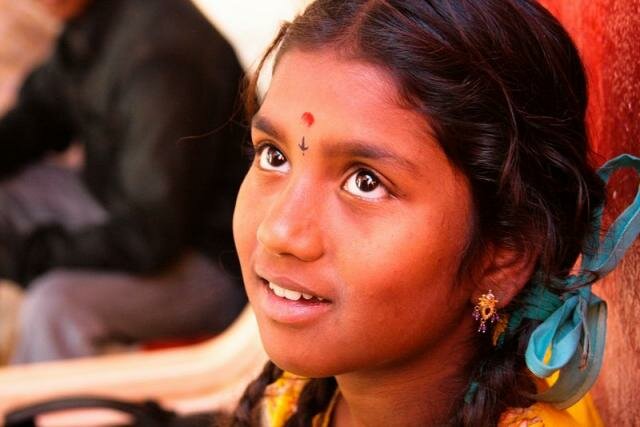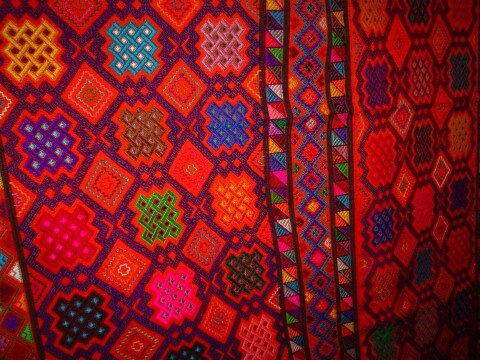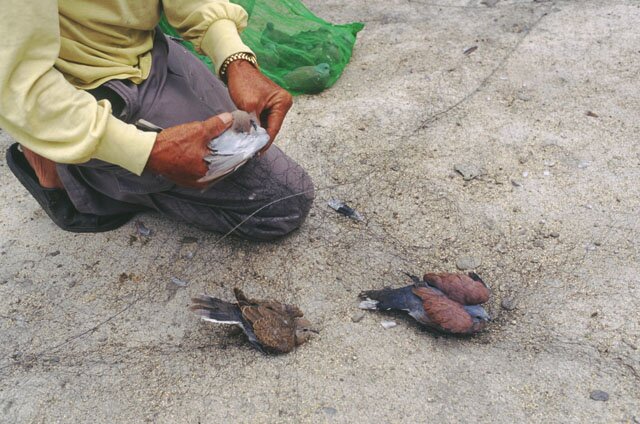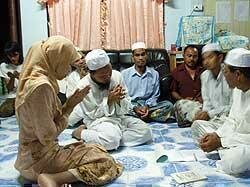BROWSE COUNTRIES/ TERRITORIES
Learning about matters of faith on a Jewish holy day.
Hundreds and thousands of Jews will stay up all night tonight to study the Torah, I am sitting here listening to an old Muslim man teach me about Judaism, the Koran and being Palestinian.

It has been seven weeks since Passover – the day marking the occasion when the plague of God passed over or spared the Jews, who had been instructed to identify themselves by painting the blood of a sacrificial lamb on their doorpost. As they celebrated the festival, they used to recite the verse “Next year in Jerusalem!” in the hopes that the following year, their Passover feast would be conducted in their holy city.

The Western Wall – which stands just under the golden dome of the al-Aqsa Mosque – is the last remnant of the Jewish Second Temple and the holiest site in Judaism.
It's been 32 years now since the Jewish people were finally returned here to Jerusalem. The men, especially, are unmistakable in their full black suits and matching broad-brimmed hats, and their ringlets of hair - kept in accordance to ancient teachings - swinging from side to side from their lowered heads, as they walked determinedly on. Tonight, they will be gathered in homes both in and outside Jerusalem's old city, where lights will burn all night.
As dusk fell today, the festival of Shavuot began.
For three days, the Jews celebrate God's giving of the Torah, or the Ten Commandments, to Moses. It is believed that when God first gave the Jews the Torah, they had not been awake to receive it. To make up for it, they now keep a vigil, to prepare to receive the divine instructions anew for the next year.
As the Jews listened to the customary reading of the Ten Commandments in the synagogues, I was doing the same, only at the feet of an old Muslim man, no more then 70 years old. He was pointing out to me the similarities between the two faiths that shared this holy city.
“God had promised them two times in the Holy land, the first, 3,500 years before, and now,” he explained about the Jews.
“Do you know their history?”
Before I could answer, he went on to recount the history of the Jewish people, from the time of the prophet Abraham.
“Abraham lived in northern Iraq and he was not welcome there. So he moved to Egypt and then later to Hebron. That is where we believed he lived,” he began.
“Abraham had a wife Sara and they had no children. Sara had a servant called Hagar and she had a son with Ibrahim and he was Ismael,” he continued, switching between the Jewish and Muslim name of the common patriarch of the two religions.
“Ibrahim then had a son with Sara when she was very old. Hagar and Ismael went to live in Mecca, and Ibrahim and Sara had the son Issac.”
He carried on recounting the history of the Jews, in that poetic manner that made the Arabs such wonderful story-tellers. Sahed is a Jerusalemite, having been born and bred here. His family was from Hebron, he had mentioned proudly, the city of Abraham. During the 1920s, his grandfather left Hebron like many other Arabs who departed from their homes in what is now the West Bank, and came to Jerusalem to “find a better life”.
Here they remained, and now with the boundary between the West Bank and Jerusalem, families were finding that they had been cut off by the political divide.
“I have a blue Jerusalem ID, so it is not allowed for me to go to the West Bank. When you go there, you will see a sign saying, 'No Israelis are allowed.' They come at their own risk.”
The sign doesn't stop him, nor the border, and for that matter, the Israeli soldiers that stand guard at the frontier between the West Bank and what is considered the territory of the State of Israel. No, when Sahed goes back to Hebron to see his family, despite the law that makes it illegal. The soldiers close the proverbial eye, doing the standard checks and allowing the Palestinians through and back again.
The blue ID means that Sahed is a citizen of Israel. He is known here as an Arab Israeli, though he does not agree with the terminology.
“They say we are Israelis, but I am not.”
I asked him what he was, and he said he was a Palestinian, or an Arab, just not an Israeli.
An issue has recently come up in the Israeli parliament. The Ministerial Committee for Legislative Affairs on Sunday approved a motion that makes it illegal to mark the Nakba. The Arabs refer to the day of the establishment of the State of Israel as the day of Nakba or “catastrophe”, because of the number of Palestinians that fled their homes as a result.
The motion will now go up to the Knesset for parliamentary decision on whether to write it into a bill. This year's Nakba celebrations here in Jerusalem have been subdued compared to previous years, but the sponsor of the bill believes that Israel needed to defend itself from “incitement from the Islamist Movement.”
This controversial bill has got both Israelis and Palestinians crying foul.
Arab-Israeli Knesset member Dr Afu Aghbaria said it was “reminiscent of a Third Reich law”.
“The Israeli government has declared a jihad on the Arab community and is slowly turning Israel to an apartheid state. I will not be surprised if the Netanyahu-Lieberman government will impose other restrictions on its Arab citizens, like barring the use of the Arabic language."
Jewish Michael Eitan from the right-wing Likud party - one of those who voted against the motion in the Committee - said,
“The State of Israel has to be certain of its ability to fight against those who wish to ruin it, not by means of reducing freedom of speech, but by holding on to our beliefs.”
At the heart of this matter is the loyalty of the Israeli Arabs. Do they, like Sahed, consider themselves as an Israeli or a Palestinian?
“'Arab Israeli' is an occupation name. They want to make it seem like we are not Palestinians. We are Palestinian-Israelis.”
That was how an Arab Israeli explained it to me just the other day.
Sahed considered himself to be living under occupation in Jerusalem. “It was better before 1993,” he said, referring to the Oslo Peace Accord signed then, under which autonomy in the West Bank was reverted to Yasser Arafat's Palestinian Authority. The rest of the world may have rewarded the parties with Nobel Peace Prizes, but for the Palestinians, it only brought before them an unfair deal.
Palestinian historian Edward Said had noted back in an editorial in 1996,
“Those of us who criticised it from the start were a tiny minority of Arabs and Jews who grasped its ungenerous, essentially humiliating implications for the Palestinian people. ... Oslo neither ended Palestinian dispossession, nor genuinely alleviated the short-term miseries of an Israeli military occupation.”
For Sahed, what the 1993 accords meant were that while the pre-Oslo checkpoints existed, they were not fixed like they are now between Jerusalem and the West Bank.
“It is even harder to get around now, than before 1993,” said Sahed.

Increased security at the Jaffa Gate of Jerusalem's Old City on Shauvot
“I know there is a lot of pressure from the Israeli side but I am satisfied to be here, to live the religion truly, not to fight, and wait. With this, you are already in victory against aggression.”
Sahed paused, and pulled a third cigarette from the box. He placed it slowly in his mouth, holding it in place with his slightly quivering lips, lighted it and continued.
“I know not everybody is patient enough. They have lost control because of what is happening. They are manipulated by the media, modern technology, like things on the internet which can change them. This leads people not to know where they are standing, to push people away from believing in God.
“The book says to them,' Look, Israelis, if you do good, you do good for yourselves. If you fo bad, I am there. God says he is there.”
He went on to point out how the Ten Commandments were common through Islam, Judaism and Christianity.
“If you want to just summarise it, worship one God and not hurt the next (person),” he said.
Yes, worship God and love thy neighbour.
As the night drew on, more cigarettes were lit. Sahed, energised by either the topic or the now-empty cup of Turkish coffee on the table between us, carried on talking about the similarities of the three monotheistic faiths.
“The Koran tells us to love all the prophets. We love Moses, Abraham, Jesus. Yes, the Koran talks about Jesus!” he told me excitedly.
“God blew his breath into Mary and she got Jesus, without defilement,” he explained. “ And did you know Mary is the only woman mentioned in the Koran? The name 'Mariam' is mentioned 33 times!”
“The Koran talks about Jesus, in one small part, but two-thirds of the Koran talks about the history of the Jews, like I told you.”
Sahed enthused about the commonalities in the three religions, with a slight exaggeration thrown in to illustrate his point. He went on as the chill of the early dawn began to seep into the small room. I seized a rare pause in his speech and excused myself. The Jews may still keep their vigil but this was me done for the day.
I asked for his permission to put all this in my story, and he agreed. I offered to write the url of the magazine for him and he abruptly shook his head and waved his hand, in case I didn't get his point.
He was a steadfast man of faith and he was not going to let the internet seduce him from his god. I left him, dragging on his cigarette. In the distance, I thought I heard the patter of feet, of Jews heading to celebrate the first dawn of the Shauvot at the Western Wall.
<BACK to other stories in FROM JERUSALEM TO THE WEST BANK
- FROM JERUSALEM TO THE WEST BANK
- Israel
- Palestinian Territories
- Middle East/West Asia
- Definition: Culture
- Geopolitics and Strategic Relations
- Of Government and Politics
- Religion and Practices
- Unrest, Conflicts and Wars
- Palestine Festival of Literature
-

- Carmela Mendoza's blog
- Login or register to post comments
 PRINT
PRINT- EMAIL THIS STORY
Login or Register
 Dan-Chyi Chua began her writing career with Channel News Asia, a regional cable network, before forsaking broadcast journalism to hit the road for a three-year sabbatical through the Middle East, China, Central America and Cuba. She has now grounded herself as a writer for asia! Magazine.
Dan-Chyi Chua began her writing career with Channel News Asia, a regional cable network, before forsaking broadcast journalism to hit the road for a three-year sabbatical through the Middle East, China, Central America and Cuba. She has now grounded herself as a writer for asia! Magazine.
- Asian Dynasties and History
- Conservation of the Environment
- Definition: Culture
- Economy and Economics
- Food and Recipe
- Geopolitics and Strategic Relations
- Health and Body
- Of Government and Politics
- Religion and Practices
- Social Injustices and Poverty Report
- Society, Class and Division
- Unrest, Conflicts and Wars






























 Another Point
Another Point An imaginary factual blog of General David Petraeus, Commander, United States Central Command
An imaginary factual blog of General David Petraeus, Commander, United States Central Command